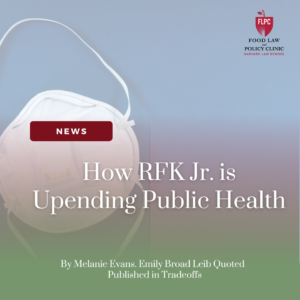By Joelle Boxer. This article was originally published on Bill of Health, the blog of Petrie-Flom Center at Harvard Law School, on January 24, 2024
Today is Maternal Health Awareness Day, focused on the theme “Access in Crisis.”
“Crisis” is the right word, yet still an understatement. In the U.S., for every 100,000 live births in 2021, nearly 33 pregnant people lost their lives. In Norway, that number was 2. Black and Native American women in the U.S. are particularly at risk, with death rates 2-3 times higher than those of white women, due to structural racism.
What can the law do to prevent these deaths? Medicaid pays for more than 40% of births in the U.S., covering 64% of Black mothers and 66% of Native American mothers. Examining efforts at the federal and state level, I highlight three options, leveraging Medicaid as a policy lever.
- Expand postpartum coverage.
In the past, when individuals were Medicaid-eligible due to pregnancy, federal law required states to provide coverage for at least 60 days postpartum. Most states stuck to this 60-day minimum, leading many new parents to struggle to obtain postpartum care while they were still insured. Maternal deaths after 60 days postpartum increased, particularly from preventable causes related to mental health and substance use.
The American College of Obstetrics and Gynecologists has led a successful movement to expand Medicaid coverage to 12 months postpartum, giving parents more time to access life-saving care. States can do this through legislation or executive orders, or through Medicaid mechanisms (a Section 1115 waiver or a state plan amendment). In 2021, the federal government made the state plan amendment option available temporarily through the American Rescue Plan. In 2023, the Consolidated Appropriation Act made this option permanent.
States are required to elect this option and receive federal matching funds to cover the extended period. Fortunately, 47 states and the District of Columbia have done so. Idaho, Arkansas, and Iowa — it’s your turn.
- Reimburse doula care.
A doula is defined as “a trained professional who provides continuous physical, emotional and informational support to their client before, during, and shortly after childbirth to help them achieve the healthiest, most satisfying experience possible.” Uzazi Village and Jamaa Birth Village, two maternal health organizations in Missouri, specifically advocate for culturally congruent community-based doulas (CCCDs), who “share the cultural background of their clients [and] work to reduce racial disparities in pregnancy and birth through a multifaceted approach that empowers women of color, mitigating discrimination, racism, loss of autonomy, and preventing other harms to communities that have been neglected by the medical system.”
Research suggests that doula care can decrease rates of C-section, pregnancy complications, and low-birthweight infants, while increasing rates of breastfeeding and overall patient satisfaction. Doulas are also reported to reduce time in labor and lower health care costs. Unfortunately, only 10 states and the District of Columbia are actively reimbursing doulas through Medicaid, with varied implementation models and certification requirements.
The remaining 40 states should either begin or continue working on their doula reimbursement implementation processes, in partnership with existing community-based organizations. Uzazi Village and Jamaa Birth Village advise that state Medicaid policies for doula care should be “carefully crafted to avoid unnecessary limitations to the scope of doulas or unnecessary cost hurdles that may turn away individuals from vulnerable communities.”
- Remove barriers related to immigration status.
Passed in 1996, the Personal Responsibility and Work Opportunity Reconciliation Act barred lawful immigrants from receiving full Medicaid benefits through federal funding for five years. However, in 2009, the Children’s Health Insurance Program Reauthorization Act restored this potential benefit for lawfully residing pregnant people and children. This group includes immigrants who are “lawfully permanent residents, asylees, refugees, immigrants paroled into the U.S. for at least one year, immigrants whose deportations are being withheld, immigrants granted conditional entry, battered children and spouses, Cuban and Haitian entrants, and trafficking victims.”
To receive Medicaid pregnancy and postpartum benefits before the five-year waiting period concludes, these individuals must 1) be otherwise eligible for Medicaid and 2) reside in a state that has exercised the option, known as ICHIA (Legal Immigrant Children’s Health Improvement Act). Unfortunately, only 25 states and the District of Columbia have exercised the ICHIA option for pregnant individuals, contributing to increased maternal health disparities in immigrant populations. The remaining 25 states should exercise the ICHIA option and consider other policies to reach undocumented immigrants, including the “unborn child option” of the Children’s Health Insurance Program and state-only funded coverage.
In the U.S., there is a crisis of maternal deaths; of access to high-quality, affordable maternal health care; and of our government’s ability to adopt evidence-based solutions that save pregnant peoples’ lives. This #MaternalHealthAwarenessDay, make your state representatives aware of these policy solutions and insist on comprehensive Medicaid coverage for moms.


